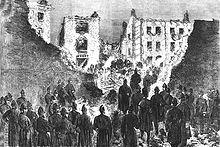Clerkenwell Outrage
| Clerkenwell explosion | |
|---|---|

The House of Detention in Clerkenwell after the bombing; seen from within the prison yard
|
|
| Location | Clerkenwell, London |
| Date | 13 December 1867 (GMT) |
|
Attack type
|
Explosion |
| Weapons | 200–548 pounds (91–249 kg) Gunpowder kegs |
| Deaths | 12 |
|
Non-fatal injuries
|
120 |
| Perpetrator | Irish Republican Brotherhood |
The Clerkenwell explosion, also known as the Clerkenwell Outrage, was a bombing in London on 13 December 1867. The Irish Republican Brotherhood, nicknamed the "Fenians", exploded a bomb to try to free one of their members being held on remand at Clerkenwell Prison. The explosion damaged nearby houses, killed 12 people and caused 120 injuries. None of the prisoners escaped. The event was described by The Times the following day as "a crime of unexampled atrocity", and compared to the "infernal machines" used in Paris in 1800 and 1835 and the Gunpowder Treason of 1605. The bombing was later described as the most infamous action carried out by the Fenians in Great Britain in the 19th century. It enraged the public, causing a backlash of hostility in Britain which undermined efforts to establish home rule or independence for Ireland.
The whole of Ireland had been under British rule since the end of the Nine Years' War in 1603. The Irish Republican Brotherhood was founded on 17 March 1858 with the aim of establishing an independent democratic republic in Ireland, and the Fenian Brotherhood, ostensibly the American wing of the Irish Republican Brotherhood, was founded in New York in 1859. The Irish Republican Brotherhood was a revolutionary fraternal organisation, rather than an insurrectionary conspiracy. It had an estimated 100,000 members by 1865, and was carrying out frequent acts of violence in metropolitan Britain.
In 1867, the Fenians were preparing to launch an armed uprising against British rule in Ireland, but their plans became known to the authorities, and members of the movement's leadership were arrested and convicted. Two succeeded in evading the police and fled to England, but they were arrested in Manchester and held in custody. On 18 September 1867, while they were being transferred from the courthouse to Belle Vue Gaol, the police van in which they were being transported was intercepted and they were freed. Police Sergeant Charles Brett was shot dead during the escape. Five suspected of involvement in the escape were tried for murder and sentenced to death. One was pardoned, and one had his sentence commuted, but the remaining three were hanged at Salford Gaol on the morning of Saturday 23 November 1867.
...
Wikipedia
